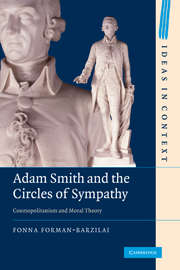Book contents
- Frontmatter
- Contents
- Acknowledgments
- Introduction: Smith's oikeiōsis
- PART I THE CIRCLE OF THE SELF
- PART II THE CIRCLE OF SOCIETY
- 3 Discipline and the socialized conscience
- 4 Perfectionism and social order
- PART III THE CIRCLE OF HUMANITY
- Conclusion: cultural pluralism, moral goods, and the “laws of nations”
- Bibliography
- Index
- IDEAS IN CONTEXT
3 - Discipline and the socialized conscience
Published online by Cambridge University Press: 03 May 2010
- Frontmatter
- Contents
- Acknowledgments
- Introduction: Smith's oikeiōsis
- PART I THE CIRCLE OF THE SELF
- PART II THE CIRCLE OF SOCIETY
- 3 Discipline and the socialized conscience
- 4 Perfectionism and social order
- PART III THE CIRCLE OF HUMANITY
- Conclusion: cultural pluralism, moral goods, and the “laws of nations”
- Bibliography
- Index
- IDEAS IN CONTEXT
Summary
The Other is the indispensable mediator between myself and me … I see myself because somebody sees me.
Jean-Paul Sartre, Being and NothingnessFor in truth habit is a violent and treacherous schoolmistress. She establishes in us, little by little, stealthfully, the foothold of her authority; but having by this mild and humble beginning settled and planted it with the help of time, she soon uncovers to us a furious and tyrannical face against which we no longer have the liberty even of raising our eyes. We see her at every turn forcing the rules of nature.
Michel de Montaigne, Of Custom, and not easily changing an accepted lawIn our attempt to understand what Smith meant by “conscience” we have, so far, examined his thoughts on sympathetic judgment, and have noted the self-referential nature of the criteria spectators use when they judge. But we need to move beyond this conventional understanding of Smith's idea of sympathy “as judgment” to consider the socializing function of sympathy in Smith's larger argument. Moral life is not only about judgment, but about action and the reasons for action. No account of ordinary morality in Smith's thought is adequate if it overlooks the disciplinary effects the spectator's surveillance and judgment have upon the agent, the extent to which the spectator motivates her to modify her conduct, to act in a “proper” way, in a way the spectator can indulge, in what Smith often referred to as a “moral” way.
Information
- Type
- Chapter
- Information
- Adam Smith and the Circles of SympathyCosmopolitanism and Moral Theory, pp. 75 - 105Publisher: Cambridge University PressPrint publication year: 2010
